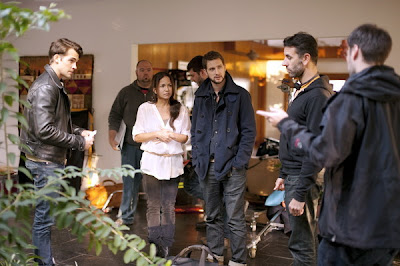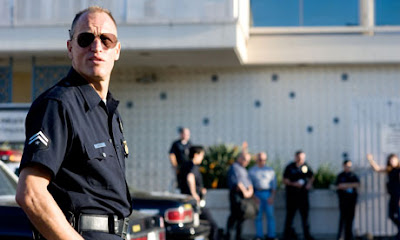 SNOW WHITE & THE HUNSTMAN
SNOW WHITE & THE HUNSTMANWritten by Evan Daugherty, John Lee Hancock and Hossein Amini
Directed by Rupert Sanders
Starring Kristen Stewart, Chris Hemsworth and Charlize Theron
Ravenna: I feel that you and I are bound.
The Grimm fairy tale best known as “Snow White” dates back to the beginning of the 19th century. It is a cautionary tale of sorts to young women everywhere that beauty is only skin deep and that true beauty, the kind that either commands respect and admiration or say the attention of a handsome prince, is to only be found on the inside. On many levels, it not only warns the reader but rather sets up the expectation that one day our prince will come and make all of our woes disappear. It is a timeless tale but it contains elements that don’t necessarily translate to today’s contemporary princess. Of course, minor issues like these would never deter Hollywood from trying to bleed it dry. And while you can put Snow White in pants, she still needs to be kissed by a prince at some point.
The trick then becomes how to modernize Snow White for today’s audience while not losing the story’s key factors. SNOW WHITE & THE HUNSTMAN tries to do so by keeping the fable set during the period (which is done masterfully) but by making it into an epic battle between the two fairest women in the land, Snow White (Kristen Stewart) and her evil stepmother and Queen, Ravenna (Charlize Theron). Their beauty is supposedly unmatched - and I say unmatched because you can never convince me that Stewart could ever look better than Theron, even on Stewart’s best day and Theron’s worst - but Snow White’s is internal and Ravenna’s is merely on the surface. Yes, they ride horses and wear armor and wield swords but beauty is each their greatest weapon. First time director, Rupert Sanders, strives to give the fairy tale a realistic edge visually but he fails to make these women into real people. Perhaps it is his lack of filmmaking experience or perhaps it is a lack of understanding when it comes to women.
SNOW WHITE AND THE HUNTSMAN spends most of its time with its title characters (Chris Hemsworth plays the hunstman) as they journey aimlessly through the land to reunite Snow White with her former subjects in exile. They barely speak (which in Stewart’s case is always best) but yet this is their love story. The film is only ever truly interesting when Theron is on screen. She is the only true evil queen (sorry, Julia!) and her obsession with beauty fuels her every move. She fears becoming old and being replaced by youth, a very real plight for many women today, especially actresses, and one that gives her character an edge I never saw in her before. This goes nowhere though and we are only left waiting for Stewart’s inner beauty to shine through and lead the people to victory. Stewart, with all her youthful vigor, never allows us to see what’s inside, leaving us with exactly the same beauty she is supposed to be fighting against. Sadly, this makes the movie itself only pretty on the outside too.



















































